
BLOG
Body transformation and TRT at 40
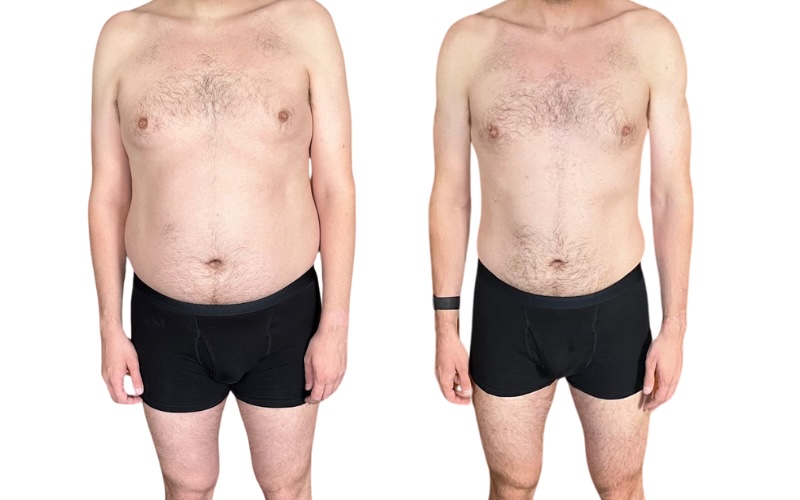
An inspiring case study that covers testosterone replacement therapy, veganism and turning things around!
When Alex had his first DEXA scan in July 2023 (left image in main pic), his work and lifestyle were creating a perfect storm of poor health, increasing his risk of life-changing conditions such as diabetes, heart disease and stroke.
“I had just turned 41 and knew that if I didn’t improve my fitness and I carried on as I was for the next 40 years, I would be in a very unhealthy place,” he says. “Assuming I actually made it that far.”
Exactly one year later, Alex has achieved a remarkable transformation, dropping more than 15kg of fat and gaining 5kg of muscle mass. A journey that required some significant changes and discipline but has reaped great rewards.
“I feel stronger, sleep better and have more vitality. And I have a much healthier work/life balance, meaning I enjoy both my job and my personal life more,” he says.
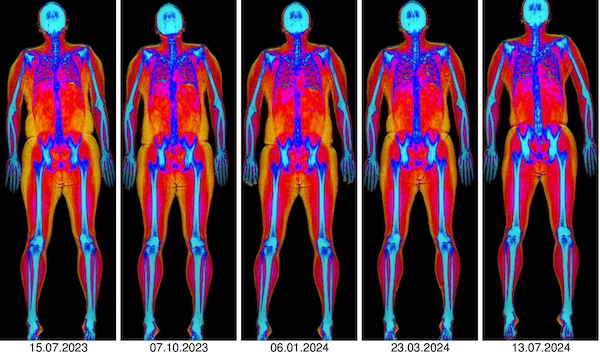
A high-pressure job spanning global time zones meant Alex was living a self-fufilling cycle of early starts, late nights, poor diet, no exercise, bad sleep and stress. It’s a profile very typical of Bodyscan customers, male and female.
“My DEXA scan results were inescapably bad. 35kg of fat, low muscle mass and high visceral fat.”
“My first DEXA scan was a big wake-up call. I knew I was putting on weight but the scan results were inescapable and comprehensively bad,” he recalls. “I was carrying 35kg of fat – more than a third of my body weight! My genetics meant it was heavily concentrated in my upper body, so it was no surprise that I had worryingly high visceral fat.
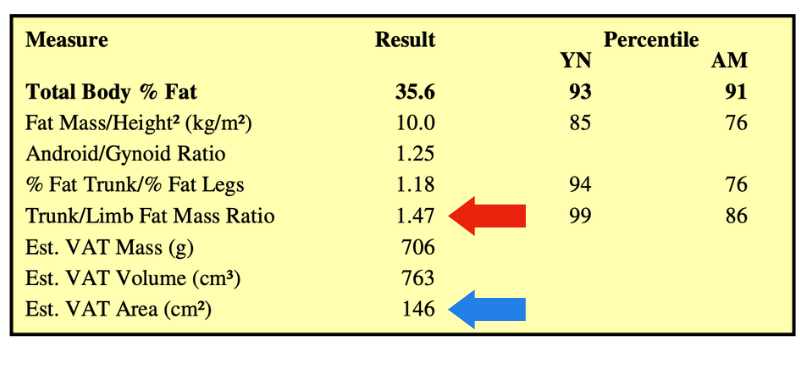
“If that wasn’t enough, my muscle mass was lower than 80% of men my age and my bone density was at the lower end of the normal range. As a report card for longevity, my DEXA scan results were probably a D-minus.”
At the time of the scan, Alex had his testosterone tested because “no matter how much I worked out, I never seemed to see any results.”
The blood test was clear – Alex had low testosterone, so embarked on TRT (testosterone replacement therapy). TRT is not steroids. It is a medically prescribed course of low but regular doses of a blend of supplementary testosterone (eg, Sustanon and HCG), supervised and monitored by a UK-based general practitioner.
“Discovering I had low testosterone was the catalyst for embarking on my fitness journey. Along with my busy job, I could see how it could be contributing to low energy and poor sleep. My body was breaking down and I was only 40. Without intervention, the prognosis for increasing muscle mass and for my long-term bone density was poor.”
Starting TRT gave Alex the impetus to overhaul his lifestyle and get things back on track.
“The DEXA scans became a crucial part of my approach to health. They made body recomposition a real possibility.”
After a 2-year break, he started running again and now runs three times a week and cycles to and from work each day. He practises a “significant amount” of yoga, does CrossFit classes and has a PT for strength training and to master gymnastics and Olympic lifts.
What is of particular interest in Alex’s story is that for the past six years, Alex has been vegan.
Which, as the transformation occurred over previous 12 months, led to the obvious question, “Alex, how did you get out of shape after five years on a plant-based diet?!”
Alex replies, “Being ‘vegan’ on its own doesn’t determine health outcomes.
“I originally became vegan for ethical reasons but paid little attention to the nutritional side. I was often eating processed convenience vegan foods from supermarkets and takeaways, and still had the high stress, poor sleep and minimal exercise. You might say I was a ‘vino’ – vegan in name only!
“Now, I have switched to a wholefood, nutrition-based approach – fresh, unprocessed plant-based meals – with a focus on macros (especially protein), micronutrients, variety and probiotics.
“Whatever your diet,” says Alex, “balance, structure and enjoyment should all be there.
Alex aims for a daily protein intake of 180g. Protein intake is an essential factor in maintaining/building muscle mass but getting high protein from plant-based food is not easy.
“I get about 80g of protein from plants – tofu, edamame, chickpeas, seitan and tempeh. The other 100g comes from two protein shakes a day,” says Alex.
To many, emulating Alex’s change of lifestyle would be too much of a handbrake turn – new, frequent and varied exercises together with a very restrictive diet. Alex admits that the change of course has been the biggest challenge and, to say the least, has taken “some adjustment”. The key was to introduce things gradually – yoga and CrossFit just once a week, getting used to them and slowly building each to three times a week.
In common with many Bodyscan customers who achieve good results, Alex had regular scans to closely monitor progress. “I decided upfront on a DEXA scan every quarter because I wanted to be sure what was happening beyond my weight on the bathroom scale.”


“The scans became a crucial part of my data-driven approach to health,” he says. “They made body recomposition a real possibility by enabling me to make the necessary adjustments to my diet and exercise regimen.”
Alex’s achievement highlights the crucial role DEXA scans can play in achieving and measuring body recomposition. Fat loss (a decrease in body fat only) and weight loss (a decrease in both fat and lean mass) can occur quite rapidly, depending on the size of the caloric deficit. Indeed, Alex’s fat loss of 15.5kg (34lbs or 2.4 stone) averages 1.3kg per month.
But muscle gain (even when in a calorie surplus) occurs much more slowly, perhaps just 150-200g per month, as was the case with this Bodyscan client, and typically around half a percent (0.5%) of bodyweight per month. Weight gain above one percent (1%) of bodyweight per month is fast enough to suggest that the calorie surplus is too high and fat is making up more of the increase than is necessary.
For Alex, his total lean gain averaged about 430g per month, or 0.4% of his starting weight.
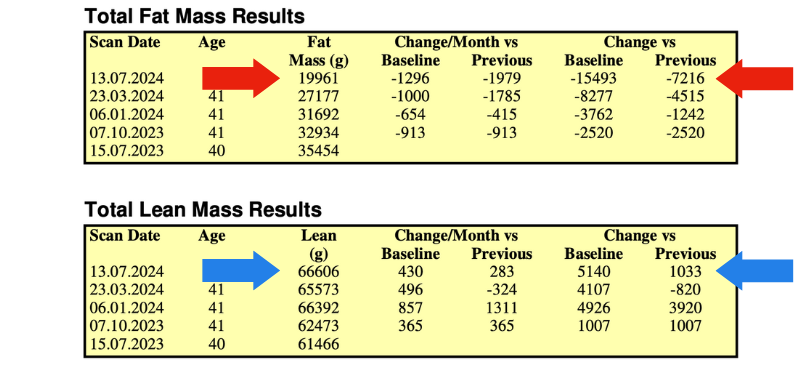
For most of the year Alex was in a planned calorie deficit, so he knew his weight on the scale must fall.
“But with the general pace of muscle growth almost imperceptible, without the scans I wouldn’t have had any idea what was really going on. Was I losing fat and maintaining muscle, losing fat and muscle together or achieving body recomposition?”
True body recomposition starkly shows the limitations of tracking weight on the scale. Alex’s weight loss is highly commendable but – all respect to Alex – not hugely remarkable. He has lost 10kg (from 99kg to 89kg) in a year.
But DEXA reveals that his change in body composition is exactly double that – 20kg. He has lost 15kg of fat and gained 5kg of muscle. That IS remarkable!
“DEXA scans every quarter have been a huge motivator. Seeing tangible progress spurred me to keep going.”
Tracking the changes with DEXA data enabled Alex to “optimise my approach, especially when I wasn’t putting on muscle as expected.”
(Optimising a programme to minimise muscle loss or maximise muscle gain could mean tweaking a number of variables: reducing the deficit; increasing protein; varying volume/intensity in the gym; increasing rest periods between sets; better sleep, etc.)
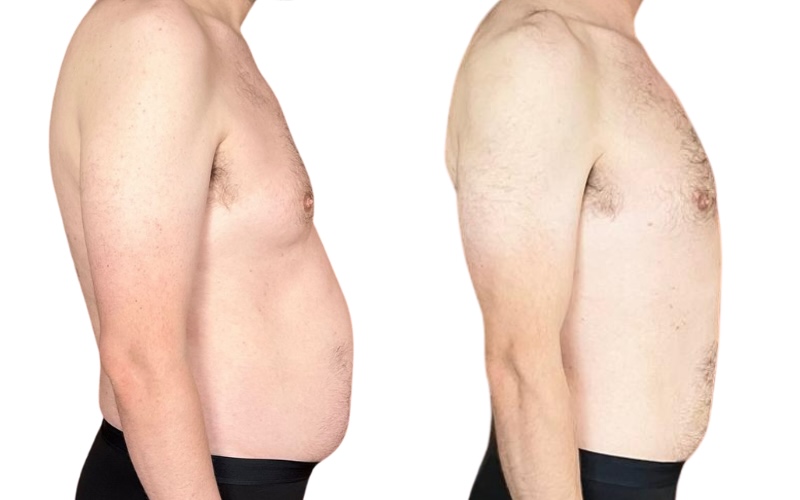
“The DEXA scans have been a huge motivator. Seeing tangible progress spurred me to keep going with what has been, admittedly, a significant change to my routine.
“The qualitative input from Bodyscan’s consultants, as well as the quantitative data, has made a big difference too. For example, advice to increase protein after I lost some lean mass resulted in gaining a kilo back while losing another 7kg of fat.”
Alex is unequivocal about the results. “My lifestyle has been completely transformed. I genuinely enjoy the activities and nourishing diet and the journey continues. I continue to get faster, stronger and more flexible as well as happier in all the things I do.
“As well as the data, the qualitative input and advice from Bodyscan’s consultants have made a big difference too.”
So, how much has TRT helped Alex? First of all, with TRT, Alex’s testosterone level is no more than “high normal”, between 25-29nmol/L. (The typical range is 10-35nmol/L for men and, in some contrast, between 0.5-2.4nmol/L for women.)
If we go back to his results, without TRT the lean gain of 0.4% of bodyweight per month is respectable and would be expected, considering his regime is not built around hypertrophy. Running and cycling will diminish muscle size, not increase it.
For a man in his 40s, however, achieving the muscle gain while in a long-term deficit suggests the TRT has helped to some degree. But not spectacularly – it is a result we might expect from a younger man (with higher testosterone) with an optimised resistance training programme.
And his regular check-ins show that the principles of energy balance are still holding – when fat loss is high, muscle gain is low, and vice versa.
Alex himself is realistic about TRT’s overall contribution: “Testosterone replacement therapy has provided me with the foundation to rebuild my strength and vitality and give me better mental focus, but it’s been the combination of consistent training, proper nutrition, and careful monitoring of my health metrics that has led to these results.
The TRT simply means I don’t have one hormonal hand tied behind my back. Like the DEXA scan, my initial blood test told me what I needed to do to achieve my goal and I have regular blood tests and scans to ensure all aspects of my health are optimised.”
Special thanks to Alex for sharing his results. If you are interested in TRT, a Google search for ‘TRT for men UK’ will provide many results. Alex used the Leger Clinic.
This blog is for information purposes only. Bodycan makes no recommendation about the topics in this case study.
Compiled and edited by Philip Chant
Bodyscan Director

